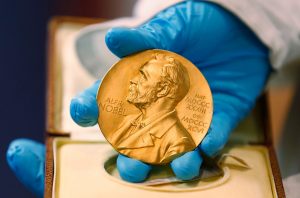The 2020 Nobel Prize in Physiology or Medicine was awarded jointly to the trio of Harvey J Alter, Michael Houghton and Charles M Rice “for the discovery of Hepatitis C Virus,” which allowed scientists to investigate it through blood tests and hence identity and devise modes of treatment. The work of the Nobel Prize-winning trio has now made the disease largely curable.
The committee said that the work of Alter, Rice and Houghton had saved “millions of lives.”
However, an AFP report suggests that more 70 million people still live with the virus, and a majority of it remains undiagnosed.
Also Read: How this year’s Nobel laureates for Medicine discovered the Hepatitis C virus
While Hepatitis A spreads through contaminated food and water, Hepatitis C is a blood-borne pathogen that causes liver diseases like cancer and cirrhosis. Patients of the disease may go years without displaying its symptoms thereby making the detection and prognosis of the disease difficult. The effects of the disease can range from illness, which lasts a few weeks, to a perennial medical complication.
The World Health Organisation estimates that at least 400,000 die in a year due to Hepatitis C and further states that the number is severely undercounted as many die from liver failure before they are properly diagnosed.
Hepatitis roughly kills more than a million people a year, making it as deadly as HIV and tuberculosis.
The WHO reports that the occurrence of the disease is especially high in the Eastern Mediterranean region and in Europe.
The common-modes by which the infection can spread are sharing of needles, blood transfusions, unsafe healthcare and unprotected sex.
The American duo of Harvey J Alter and Charles M Rice and Briton Michael Houghton were felicitated for discovering the Hepatitis C virus, which is markedly different from its other viral strains of A and B.
Their research fast-tracked the development of antiviral drugs and blood tests that help mitigate and battle the disease, although a vaccine for the disease is yet to be discovered.
Around 80% of the people exposed to the virus end up developing complications and chronic conditions, especially cirrhosis that can then lead to organ failure.
Treatment of Hepatitis C had been moderately effective for years, and could only cure half of the patients suffering from it.
However, a new generation of treatment of direct-acting antivirals has helped the success rate soar up to 95%.
New treatment regimens, however, remain exceedingly expensive in many regions.
Also Read: Nobel Prize for Medicine 2020 awarded to Harvey J Alter, Michael Houghton, Charles M Rice
In 2017, the WHO estimated that just 19% of those infected globally received a diagnosis. Fewer than 10% received DAAs.
The Nobel committee said Monday that the world could for the first time eradicate Hepatitis C.
“To achieve this goal, international efforts facilitating blood testing and making antiviral drugs available across the globe will be required,” it said.





